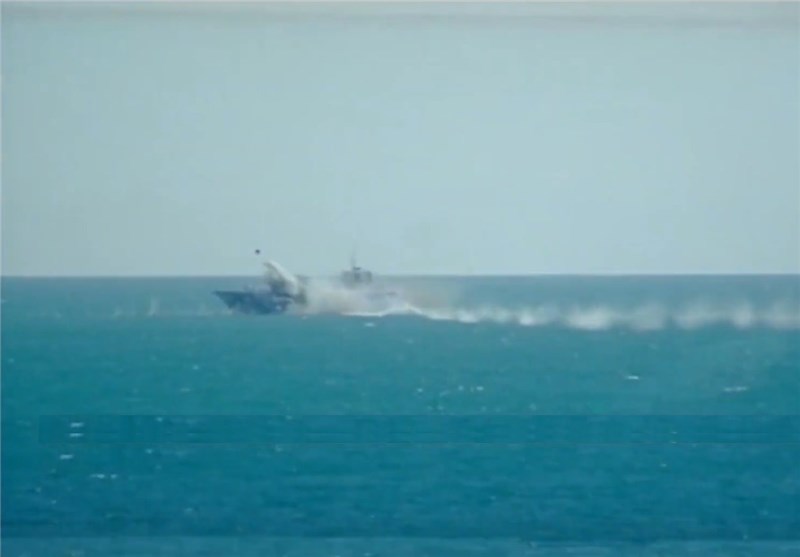 IRGC naval drill ' The Great Prophet-9'[/caption]
IRGC naval drill ' The Great Prophet-9'[/caption]Though Irans Great Prophet-9 military exercise ended last month, you can count on Tehrans military to wring every last drop of bellicosity from the eventsuch as showing off an apparently armed drone taking a bead on a ship crossing the Strait of Hormuz.
Iran conducted the exercise during the last week of February, and centered it around the theatrical, Michael Bay-esque destruction of a stationary wooden aircraft carrier prop floating off Irans Larak Island.
The fake Nimitz-like mockup, which Tehran reportedly used as a set for an upcoming film, served as an effigy of the U.S. Navys most iconic warship. American carriers are a constant irritant to Iran as they loom off its coast.
But the exercise contained another threat to a different U.S. strategic interestshipping.
It was a subtle threat, and to figure it out takes some sleuthing. Helpfully, Iran recently broadcasted the drones surveillance footage and its coordinates on state television.
Heres the footagewhich shows video from the Shahed-129s camera. Deputy commander Hossein Salami of the Iranian Revolutionary Guards Corps narrated the events from a studio.
The Shahed-129 outwardly resembles the British Watchkeeper and Israeli Hermes 450. The machine represents Irans foray into building a medium altitude, long endurance UAVa larger, more capable vehicle than the tactical drones that make up much of Tehrans arsenal.
As Salamis rattled off the Shahed-129s capabilities for the audience, the drones camera zoomed in on a ship. The footage included coordinatesmeaning we can pinpoint where the drone and the ship were. Weve created a shareable map with the coordinates.
The drone was above a ship transiting the Strait of Hormuz.
The strait is a narrow and crucial choke point for oil tankers as they leave the Persian Gulf on their way to markets around the world. Shut down the strait, and you can shut down a hefty chunk of the Middle Easts energy exports.
Threatening the closure of the strait is by no means a new tactic for Iranian officials. Theyre well aware that disrupting or closing the straight would harm the U.S. and global economies. And to be sure, Iran positions its military accordingly.
During the 1980s tanker war, Iran and Iraq attacked shipping vessels that carried each others exports through the Persian Gulf. American sailors also got caught in the crossfire. During the war, an Iraqi Mirage jet struck the American frigate USS Stark with two Exocet missilesand nearly sank her.
With sanctions against Irans oil sector in the works in late 2011 and early 2012, Tehran threatened to close the strait and warned the U.S. not to allow the aircraft carrier USS John C. Stennis to sail through it. Stennis ultimatelymade the journey, the strait remained open and Iran backed off its threat.
The IRGC has described the Great Prophet-9 exercise and its martial bravado as backup for the Iranian nuclear negotiating team, who are trying to reach an accord with the U.S. and its allies over the fate of Tehrans nuclear program.
Whether the Shahed-129 could actually back up a threat to shipping in the strait, however, is up for debate.
The IRGC claims the Shahed is an armed dronea UCAVcapable of firing Sadid air-to-ground missiles.
But there are reports that Iran has had trouble developing the Sadid because of sanctions. And while the Shahed has made appearances in Syria, there are no confirmed reports of the drone carrying out any air strikes there.
The footage broadcast on Iranian TV depicted the missiles attached to the Shaheds wings. Indeed, Iranian troops fired a number of munitions at the wooden prop carrier, including rockets fired from speedboats, and cruise missiles fired from land and one from a helicopter.
However, none of the available footage has shown the Shahed firing its missiles. Like with many things involving Irans military, the weapons could just be for show.
But the footage does lend credence to claims that Qeshman Iranian island in the straitis home to a UAV facility.
In June 2013, the Open Source IMINT blog published satellite imagery that showed a ground control station and pneumatic launcher on a runway at Qeshm. Iran uses similar hardware to launch and control Ababil and Mohajer drones.
The Shaheds coordinates during takeoff placed it on Qeshm, albeit slightly north of the suspected runway.
In any case, we wont be left wanting for morenow that Great Prophet-9 is over. Iranian Brig. Gen. Ahmad Reza Pourdastan has already promised a new round of exercises, this time for electronic warfare, later in March.
By War Is Boring










